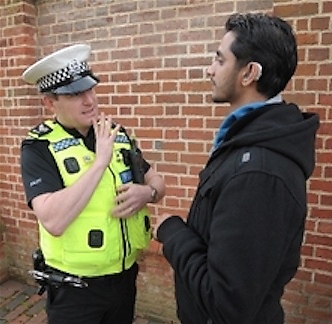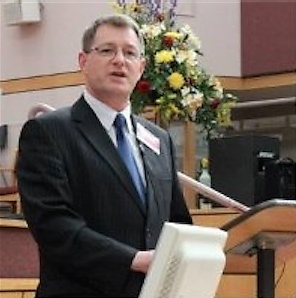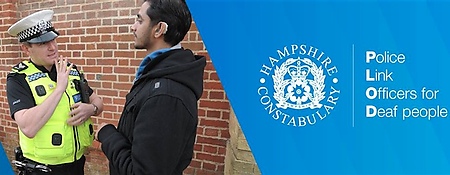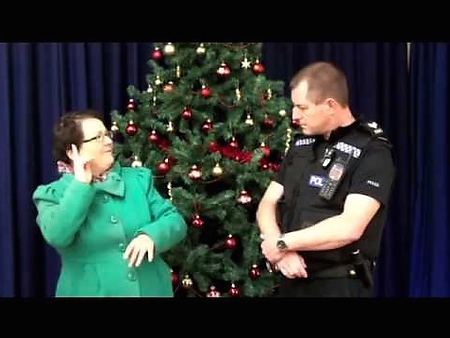Deaf Life29th December 2015
Setting High Standards of Deaf Awareness Within Public Service
Setting up the country's first PLOD, Sgt Barham leads the way on deaf friendly communication
 The Christmas and New Year festive period is a good time to appreciate the commitment and efforts of our public services. Whether it is Police, Ambulance or Fire, need them even during the Christmas break, and they are there. There are of course still issues around access for the deaf community, and communication barriers when dealing with individuals, but they are system failures, not the fault of the individual we might be dealing with.
The Christmas and New Year festive period is a good time to appreciate the commitment and efforts of our public services. Whether it is Police, Ambulance or Fire, need them even during the Christmas break, and they are there. There are of course still issues around access for the deaf community, and communication barriers when dealing with individuals, but they are system failures, not the fault of the individual we might be dealing with.
In writing about the Police Liaison Officers for the Deaf (PLOD) in Hampshire recently, I came across Police Sergeant Glen Barham. Asking Glen a few questions about the Hampshire PLOD, I discovered that he was the person responsible for the first one being set up in the country and I was interested to know the story behind why.
 “In 1990, I was a young, fresh-faced police constable on duty at a football match in Southampton”, Glen explained. I stopped a car and the driver beckoned me over. When I spoke to him, I realised he was deaf. I felt the panic of not knowing how to communicate with him. In fact, all he was asking me was what the final score was. I thought about how to explain that and then I held up 1 finger and then made a '0' with my hand, indicating 1 – 0.”
“In 1990, I was a young, fresh-faced police constable on duty at a football match in Southampton”, Glen explained. I stopped a car and the driver beckoned me over. When I spoke to him, I realised he was deaf. I felt the panic of not knowing how to communicate with him. In fact, all he was asking me was what the final score was. I thought about how to explain that and then I held up 1 finger and then made a '0' with my hand, indicating 1 – 0.”
Pleased with his impromptu signs at the time, later reflection made Glen think about how little he had been able to communicate with the deaf man and he decided there and then to do something about it. Work and family commitments got in the way but in 1998, he enrolled on a sign language course, and it was access to his deaf tutor Suzanne Chivers, that changed the whole approach to policing of the deaf community in Hampshire.
 “When Suzanne found out that I was a police officer, she asked to see me at the end of the lesson,” Glen recalled. “I waited to meet with her but what I wasn't expecting, was a question that would change my life. I know that seems incredibly dramatic but it's true. You see, the question that Suzanne asked me was, do you know how difficult it is for deaf people to access the police?"
“When Suzanne found out that I was a police officer, she asked to see me at the end of the lesson,” Glen recalled. “I waited to meet with her but what I wasn't expecting, was a question that would change my life. I know that seems incredibly dramatic but it's true. You see, the question that Suzanne asked me was, do you know how difficult it is for deaf people to access the police?"
“I'd never given it any real thought before,” Glen continued, “but Suzanne had sparked an interest in me to make a difference and to improve that access. In the weeks and months that followed, I met with other deaf people, and a colleague Lynne Fanton (retired), to explore the situation and look at a possible solution.”
Police Link Officers for Deaf people or PLOD was conceived from those conversations and it was launched in October 1999, the first police force to do so. PLOD is about recognising what access means to deaf people and to adapting the police response accordingly. It is also about understanding the different needs of a wide range of deaf people, including Deaf, deafblind, deafened and hard of hearing.
 Testament to the extent of his intentions when setting up the PLOD, Glen Barham completed his Level 1 through to Level 4, before then obtaining his Postgraduate Degree in BSL/English Interpreting with the University of Central Lancashire. He is now an NRCPD interpreter, although he does not undertake any interpreting work within the Criminal Justice System.
Testament to the extent of his intentions when setting up the PLOD, Glen Barham completed his Level 1 through to Level 4, before then obtaining his Postgraduate Degree in BSL/English Interpreting with the University of Central Lancashire. He is now an NRCPD interpreter, although he does not undertake any interpreting work within the Criminal Justice System.
Commenting on his studies Glen told me, “When you’re learning, it is really difficult to see the progress you are making but I remember that there was a Deaf man that I found difficult to understand. I dreaded meeting him because I knew it was a challenge. I hadn’t seen him for months and I was told that he would be attending a meeting. I wasn’t looking forward to it but, when he arrived, he began signing and I actually understood him. The meeting went well and I suddenly realised that I was improving. For me, having Deaf tutors was so important because you are exposed to the culture as well. I don’t think there is any substitute for that.”
 Attending deaf clubs in Portsmouth, Fareham, Southampton and Farnborough on a regular basis, Sergeant Barham also attends schools to meet with deaf children. “Visiting clubs are a great opportunity to meet in an informal way and get to know people,” Glen said enthusiastically. “We have had situations where months after a visit someone has needed to contact the police for something and they have felt confident because they met us at the Deaf Club.”
Attending deaf clubs in Portsmouth, Fareham, Southampton and Farnborough on a regular basis, Sergeant Barham also attends schools to meet with deaf children. “Visiting clubs are a great opportunity to meet in an informal way and get to know people,” Glen said enthusiastically. “We have had situations where months after a visit someone has needed to contact the police for something and they have felt confident because they met us at the Deaf Club.”
Setting up the PLOD in direct liaison with deaf people across Hampshire, Sergeant Barham has formed good working relationships with Sonus (formerly Hampshire Deaf Association) and the Deaf and Sensory Teams working within Social Services. With support from the Chief Constable at Hampshire, as well as from operational officers, the PLOD and the issue of Deaf Access to policing has become embedded and mainstreamed throughout Hampshire Police.
 Thoughtful and considerate about his role and the work of the PLOD within the deaf community, Sergeant Barham’s efforts were recognised in Her Majesty’s Birthday Honours List in 2006 when he became the proud recipient of an MBE for ‘Services to the Police establishing Police Link Officers for Deaf people’. Attending Buckingham Palace with his proud family, Glen was presented with his MBE by Princess Anne. “I remember that as she had finished talking with me, she shook my hand, smiled and said, ‘And you called it PLOD, which I think is very funny’. It was an amazing experience for me and my family.”
Thoughtful and considerate about his role and the work of the PLOD within the deaf community, Sergeant Barham’s efforts were recognised in Her Majesty’s Birthday Honours List in 2006 when he became the proud recipient of an MBE for ‘Services to the Police establishing Police Link Officers for Deaf people’. Attending Buckingham Palace with his proud family, Glen was presented with his MBE by Princess Anne. “I remember that as she had finished talking with me, she shook my hand, smiled and said, ‘And you called it PLOD, which I think is very funny’. It was an amazing experience for me and my family.”
Despite his great efforts and the positive impact the PLOD is having on police/deaf relations throughout Hampshire, some police forces still have no PLOD in place. Asking Glen about that he told me, “When you look around the UK, you see that there are police forces where Deaf access does not seem to have been greatly considered. I think that with the police, just like everyone else, we don’t know what we don’t know. Sometimes we need someone to ask us the question and to challenge us on our service provision to make things happen – just like Suzanne asking me that question back in 1998.”
 “There has not been a great history of engagement between police and deaf people and, understandably, considering the history of Milan 1880, there can be a distrust by Deaf people of hearing-led organisations. The police are ‘hearing‑led’. I don’t think that police forces are deliberately excluding deaf people but I do think there is a general misunderstanding of the issues of access and that goes beyond the police. People will often consider that Deaf people can have full access to information by reading, that Deaf people share the same background information that hearing people may have picked up from the radio, from television, from social media or by eavesdropping.”
“There has not been a great history of engagement between police and deaf people and, understandably, considering the history of Milan 1880, there can be a distrust by Deaf people of hearing-led organisations. The police are ‘hearing‑led’. I don’t think that police forces are deliberately excluding deaf people but I do think there is a general misunderstanding of the issues of access and that goes beyond the police. People will often consider that Deaf people can have full access to information by reading, that Deaf people share the same background information that hearing people may have picked up from the radio, from television, from social media or by eavesdropping.”
 Still ambitious about improvements that can be made locally, the Sergeant is constantly considering what more can be done. The current programme of work is considering how the police can develop opportunities for social learning to inform deaf people about the police processes and practices. His recent BSL film on Motorway Safety has been well received, so the Sergeant is looking at what more they can do, including the opportunity for the community to ask questions.
Still ambitious about improvements that can be made locally, the Sergeant is constantly considering what more can be done. The current programme of work is considering how the police can develop opportunities for social learning to inform deaf people about the police processes and practices. His recent BSL film on Motorway Safety has been well received, so the Sergeant is looking at what more they can do, including the opportunity for the community to ask questions.
 With high-level knowledge and understanding of the deaf community, Glen Barham’s interest in deafness has served as a trigger for improving deaf access to the police in Hampshire. In a final comment about deafness, policing and access Glen told me, “There are people who consider that deafness is a disability and there are deaf people who will say, ‘I’m not disabled, I’m Deaf’. What I would say is that deafness is a difference and a difference is only a disability when a barrier is put in the way. When barriers are removed, access will happen and then we can truly engage.”
With high-level knowledge and understanding of the deaf community, Glen Barham’s interest in deafness has served as a trigger for improving deaf access to the police in Hampshire. In a final comment about deafness, policing and access Glen told me, “There are people who consider that deafness is a disability and there are deaf people who will say, ‘I’m not disabled, I’m Deaf’. What I would say is that deafness is a difference and a difference is only a disability when a barrier is put in the way. When barriers are removed, access will happen and then we can truly engage.”
With more like-minded public services throughout the country, we can but dream about the progress that could be made.
Article by Sarah Lawrence
posted in Community / Deaf Life
29th December 2015





